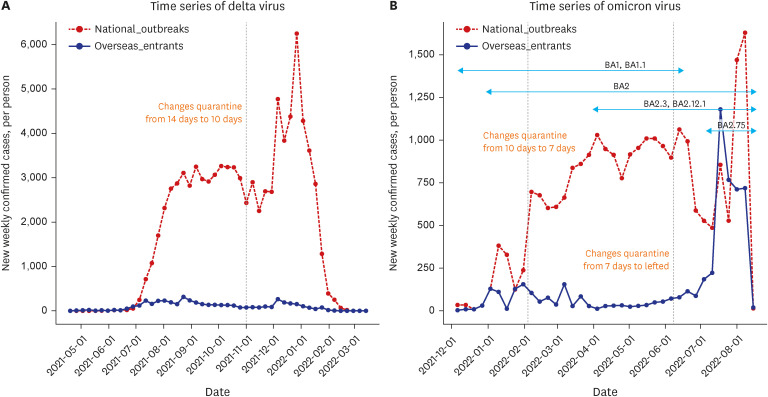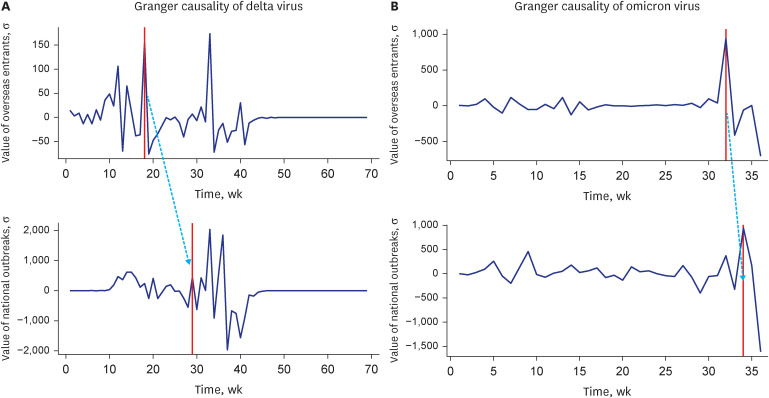J Korean Med Sci.
2023 Jul;38(28):e223. 10.3346/jkms.2023.38.e223.
The Impact of Entry Restrictions on the Spread of Severe Acute Respiratory Syndrome Coronavirus Variants Between 2021 and 2022
- Affiliations
-
- 1Artificial Intelligence and Big-Data Convergence Center, Gil Medical Center, Gachon University College of Medicine, Incheon, Korea
- 2Department of Preventive Medicine, Gachon University College of Medicine, Incheon, Korea
- 3Division of Emerging Infectious Diseases, Bureau of Infectious Disease Diagnosis Control, Korea Disease Control and Prevention Agency, Cheongju, Korea
- 4Department of Information and Statistics, Research Institute of Natural Science, Gyeongsang National University, Jinju, Korea
- 5Department of Bio & Medical Bigdata (BK21 Plus), Gyeongsang National University, Jinju, Korea
- KMID: 2544478
- DOI: http://doi.org/10.3346/jkms.2023.38.e223
Abstract
- To contain the surge of severe acute respiratory syndrome coronavirus 2 (SARS-CoV-2), the South Korean government has implemented non-pharmacological interventions as well as border restrictions. The efficacy of entry restrictions should be evaluated to facilitate their preparation for new variants of SARS-CoV-2. This study explored the impact of border policy changes on overseas entrants and local cases of SARS-CoV-2 variants. Data from the Korea Disease Control and Prevention Agency randomly collected between April 11, 2021 and August 20, 2022 were evaluated using the Granger causality model. The results showed that the outbreak gap of delta variants between international and domestic cases was 10 weeks, while that of omicron variants was approximately 2 weeks, meaning that the quarantine policy helped contain delta variants rather than more transmissible variants. It is recommended that countries implement quarantine policies based on particular purposes accounting for the specific features of different variants to avoid potential negative impacts on the economy.
Keyword
Figure
Reference
-
1. Lee Y, Kim M, Oh K, Kang E, Rhie YJ, Lee J, et al. Comparison of initial presentation of pediatric diabetes before and during the coronavirus disease 2019 pandemic era. J Korean Med Sci. 2022; 37(22):e176. PMID: 35668686.2. Jo Y, Shrestha S, Radnaabaatar M, Park H, Jung J. Optimal social distancing policy for COVID-19 control in Korea: a model-based analysis. J Korean Med Sci. 2022; 37(23):e189. PMID: 35698839.3. Lee H, Kim Y, Kim E, Lee S. Risk assessment of importation and local transmission of COVID-19 in South Korea: statistical modeling approach. JMIR Public Health Surveill. 2021; 7(6):e26784. PMID: 33819165.4. Jung J. Preparing for the coronavirus disease (COVID-19) vaccination: evidence, plans, and implications. J Korean Med Sci. 2021; 36(7):e59. PMID: 33619920.5. Jung J, Lee J, Kim E, Namgung S, Kim Y, Yun M, et al. Frequent occurrence of SARS-CoV-2 transmission among non-close contacts exposed to COVID-19 patients. J Korean Med Sci. 2021; 36(33):e233. PMID: 34427062.6. Kim YC, Kim B, Son NH, Heo N, Nam Y, Shin A, et al. Vaccine effect on household transmission of omicron and delta SARS-CoV-2 variants. J Korean Med Sci. 2023; 38(1):e9. PMID: 36593690.7. Korea Disease Control and Prevention Agency. Press release. (3.30) Regular briefing of central disaster and safety countermeasure headquarters on COVID-19. Updated March 31, 2020. Accessed November 30, 2022. https://ncov.kdca.go.kr/en/tcmBoardView.do?brdId=12&brdGubun=125&dataGubun=&ncvContSeq=353828&contSeq=353828&board_id=1365&gubun= .8. Chen H, Shi L, Zhang Y, Wang X, Sun G. A cross-country core strategy comparison in China, Japan, Singapore and South Korea during the early COVID-19 pandemic. Global Health. 2021; 17(1):22. PMID: 33618688.9. Embassy of the Republic of Korea in the USA. New Entry/Quarantine Procedures for Individuals who Completed COVID-19 Vaccination in Korea. Updated 2021. Accessed Accessed June 12, 2023. https://overseas.mofa.go.kr/us-en/brd/m_4500/view.do?seq=761013&srchFr=&srchTo=&srchWord=&srchTp=&multi_itm_seq=0&itm_seq_1=0&itm_seq_2=0&company_cd=&company_nm=&page=1 .10. Korea Disease Control and Prevention Agency. Guidance on shortening the quarantine and manual surveillance period for contacts and overseas arrivals. Updated November 1, 2021. Accessed November 30, 2022. http://nqs.kdca.go.kr/nqs/quaStation/busan.do?gubun=notice&fromMainYn=Y&ctx=PS1&contentid=221854 .11. Korea Disease Control and Prevention Agency. Omicron mutation-related changes in quarantine measures for overseas arrivals. Updated February 3, 2022. Accessed November 30, 2022. http://nqs.kdca.go.kr/nqs/quaStation/gimhae.do?gubun=notice&fromMainYn=Y&ctx=BB1&contentid=226274 .12. Korea Disease Control and Prevention Agency. Notice of suspension of pre-entry inspection for overseas arrivals. Updated Aug 31, 2022. Accessed December 2, 2022. https://www.kdca.go.kr/board.es?mid=a20504000000&bid=0014&nPage=2 .13. Kim IH, Park AK, Kim JM, Kim HM, Lee NJ, Woo SH, et al. COVID-19 variant surveillance in the Republic of Korea. Public Health Wkly Rep. 2021; 14(16):922–929.14. Granger CW. Investigating causal relations by econometric models and cross-spectral methods. Econometrica. 1969; 37(3):424–438.15. Wells CR, Pandey A, Fitzpatrick MC, Crystal WS, Singer BH, Moghadas SM, et al. Quarantine and testing strategies to ameliorate transmission due to travel during the COVID-19 pandemic: a modelling study. Lancet Reg Health Eur. 2022; 14:100304. PMID: 35036981.16. Kucharski AJ, Jit M, Logan JG, Cotten M, Clifford S, Quilty BJ, et al. Travel measures in the SARS-CoV-2 variant era need clear objectives. Lancet. 2022; 399(10333):1367–1369. PMID: 35247312.17. Kwon SL, Oh J. COVID-19 vaccination program in South Korea: a long journey toward a new normal. Health Policy Technol. 2022; 11(2):100601. PMID: 35127400.18. Jalali N, Brustad HK, Frigessi A, MacDonald EA, Meijerink H, Feruglio SL, et al. Increased household transmission and immune escape of the SARS-CoV-2 omicron compared to delta variants. Nat Commun. 2022; 13(1):5706. PMID: 36175424.19. Andrews N, Stowe J, Kirsebom F, Toffa S, Rickeard T, Gallagher E, et al. COVID-19 vaccine effectiveness against the omicron (B.1.1.529) variant. N Engl J Med. 2022; 386(16):1532–1546. PMID: 35249272.20. Central Disease Control Headquarters. Press release. South Korea announces the roadmap for gradual return to normal (10.29). Updated October 29, 2021. Accessed December 1, 2022. https://ncov.kdca.go.kr/en/tcmBoardView.do?brdId=12&brdGubun=125&dataGubun=&ncvContSeq=368308&contSeq=368308&board_id=1365&gubun= .
- Full Text Links
- Actions
-
Cited
- CITED
-
- Close
- Share
- Similar articles
-
- The pros and cons of entry restrictions: are entry restrictions really effective in preventing the spread of SARS-CoV-2?
- SARS-CoV-2 vaccine challenge based on spike glycoprotein against several new variants
- Epidemiology, virology, and clinical features of severe acute respiratory syndrome -coronavirus-2 (SARS-CoV-2; Coronavirus Disease-19)
- Epidemiology, Virology, and Clinical Features of Severe Acute Respiratory Syndrome Coronavirus 2 (SARS-CoV-2; Coronavirus Disease-19)
- Increased viral load in patients infected with severe acute respiratory syndrome coronavirus 2 Omicron variant in the Republic of Korea



